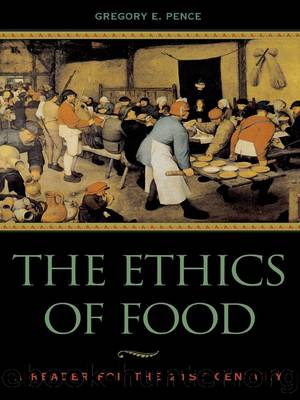The Ethics of Food by Unknown

Author:Unknown
Language: eng
Format: epub
ISBN: 9780742578883
Publisher: Rowman & Littlefield Publishers
Published: 2013-06-25T00:00:00+00:00
The Politics of Biosafety
Biosafety, or the prevention of biohazards caused by genetic engineering, is emerging as the most important environmental and scientific issue of our time. Biosafety issues are intimately linked to the politics of science, and to the conflicting perspectives of different scientific cultures and traditions.
One conflict is between the ecological sciences that assess the impact of genetic engineering on the environment and on human health, and reductionist sciences that promote production based on genetic engineering.
A second conflict is between private-interest and public-interest science. When the techniques of recombinant DNA were emerging in the late 1970s and 1980s, the crippled organisms that resulted from the experiments were not meant to survive in the environment. The main practitioners during this phase were university scientists, and they themselves called for a moratorium on recombinant DNA research.
During the 1980s and 1990s, scientists who had developed genetic engineering techniques left universities to start biotechnology firms. During this phase, concerns for safety were sidelined by the promise of biotech miracles. Today, genetically engineered organisms are being released for production and consumption on global markets, and small, start-up biotech firms are being bought up by giant chemical corporations.
The biosafety issues that were outlined by university scientists using crippled organisms are very different from those posed by robust organisms being produced by transnational corporations for global markets. These issues interfere in the market expansion of genetic engineering in agriculture, and thus industry has attempted to suppress the debate in four main ways.
First, they invoke a call to âsound science,â which they equate with industry-friendly science, and treat industry-independent science as âjunk science.â âSound scienceâ has become like a mantra for banishing safety regulations. This was the phrase used by the industry in a letter to President Clinton at the G7 Summit in Denver in 1997.22 It is the language of The Wall Street Journal editorial accusing Europe of practicing âjunk scienceâ by banning the import of hormone-fed beef, and referring to the World Trade Organization (WTO) decision against the ban as âreal science.â23 According to the U.S. agricultural secretary, Dan Glickman, who has stated categorically that the United States will stand behind its genetically engineered foods and oppose any European labeling requirements as a trade violation,
Weâve got to make sure that sound science prevails, not what I call historic culture, which is not based on sound science. Europe has a much greater sensitivity to the culture of food as opposed to the science of food. But in the modern world, we just have to keep the pressure on the science. Good science must prevail in these decisions.24
Download
This site does not store any files on its server. We only index and link to content provided by other sites. Please contact the content providers to delete copyright contents if any and email us, we'll remove relevant links or contents immediately.
Craft Beer for the Homebrewer by Michael Agnew(18237)
Marijuana Grower's Handbook by Ed Rosenthal(3677)
Barkskins by Annie Proulx(3367)
Project Animal Farm: An Accidental Journey into the Secret World of Farming and the Truth About Our Food by Sonia Faruqi(3212)
Red Famine: Stalin's War on Ukraine by Anne Applebaum(2928)
The Plant Messiah by Carlos Magdalena(2927)
0041152001443424520 .pdf by Unknown(2843)
Organic Mushroom Farming and Mycoremediation by Tradd Cotter(2688)
In the Woods by Tana French(2587)
Beer is proof God loves us by Charles W. Bamforth(2453)
7-14 Days by Noah Waters(2409)
Between Two Fires by Christopher Buehlman(2316)
Borders by unknow(2303)
Reservoir 13 by Jon McGregor(2300)
Meathooked by Marta Zaraska(2256)
The Art of Making Gelato by Morgan Morano(2254)
Birds, Beasts and Relatives by Gerald Durrell(2217)
The 7 Habits of Highly Effective People: Powerful Lessons in Personal Change (25th Anniversary Edition) by Covey Stephen R(2189)
The Lean Farm Guide to Growing Vegetables: More In-Depth Lean Techniques for Efficient Organic Production by Ben Hartman(2135)
